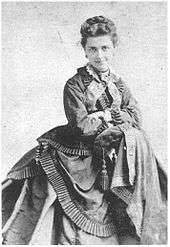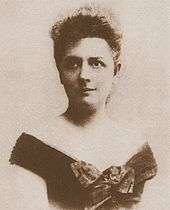Jeannette Thurber


Jeanette Thurber (also known as Jeannette Meyers Thurber, January 29, 1850 in Delhi, New York – January 2, 1946 in Bronxville, New York) was amongst the first major patrons of classical music in the United States. She was the daughter of Henry Meyers, an immigrant violinist from Copenhagen, Denmark, and Annamarie Coffin Price.
Life
Jeanette Meyers was educated at the Paris Conservatory. Aged 19, she married the later millionaire grocery wholesaler, Frances Beatty Thurber (Delhi, November 13, 1842 – Manhattan, July 4, 1907), on September 15, 1869. The couple had two daughters, Marianne and Jeannette. The family had a Summer home at Onteora Park in the Catskill Mountains.[1][2]
In 1884 she founded the National Conservatory of Music of America and its adjunct American Opera Company, both in New York and open to female and black students and with scholarships for gifted students.[3] In 1884 she sponsored New York City's first Wagner festival. In 1888/89 she sponsored the New York debut of the Boston Symphony.
In 1892, she was responsible for bringing the Czech composer Antonín Dvořák to the United States to head her conservatory until 1895. Dvořák was persuaded by the staggering annual salary of $15,000 and four months' summer leave in exchange for three hours of daily teaching and six annual concerts, although the Panic of 1893 caused the salary payments to become somewhat irregular. As Dvořák's amanuensis, the African-American baritone and composer Harry Burleigh assisted in transcribing and part preparation, but also introduced the composer to African-American spirituals.[3]
It was her ambition to found a uniquely American school of classical music composition, a national conservatory, federally funded and based in Washington with branches throughout the United States. At her death at the age of almost 96, a laudatory obituary appeared in The New York Times and said of her national conservatory:
The conservatory, of which the New York home was intended as the beginning, never reached Washington. Nor were national branches ever established. An educational plan of the loftiest and best, admirably developed on the artistic side, did not find the full measure of financing necessary, for its permanence. But it was Mrs. Thurber who established a precedent in this field which never will be forgotten, as one of the works which made her life and her vision and invincible spirit so valuable to the musical advancement of America.[4]
References
- ↑ "F. B. Thurber Dead", obituary in The New York Times, July 5, 1907
- ↑ "W. E. Connor to Wed", The New York Times, April 24, 1913
- 1 2 "The Deal That Brought Dvořák to New York" by Michael Cooper, The New York Times, August 23, 2013
- ↑ "Friend of Music", unsigned obituary in The New York Times, January 12, 1946.
- Rubin, Emanuel (Autumn 1990). "Jeannette Meyers Thurber and the National Conservatory of Music". American Music 8 (3): 294–325. doi:10.2307/3052098. JSTOR 3052098.
External links
 Media related to Jeannette Thurber at Wikimedia Commons
Media related to Jeannette Thurber at Wikimedia Commons- "View From Even Further East: The Importance of Being Europe" by Daniel Freisenfeld, NewMusicBox, November 1, 2003
- "In Conversation with Maurice Peress" by Molly Sheridan, NewMusicBox, July 8, 2005
- Jeannette Thurber's connection to Dvořák's Te Deum, Op. 103.
- "Antonín Dvořák and the National Conservatory of Music" by Tali Makell, music director of the Chamber Philharmonia of New York
|